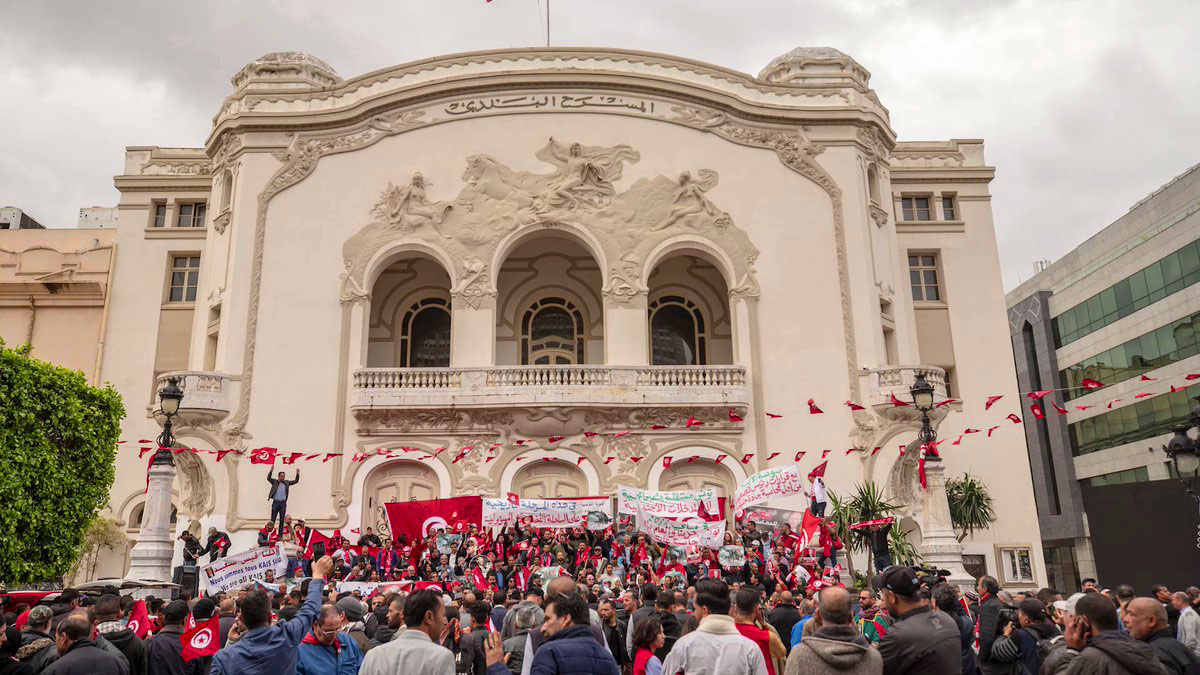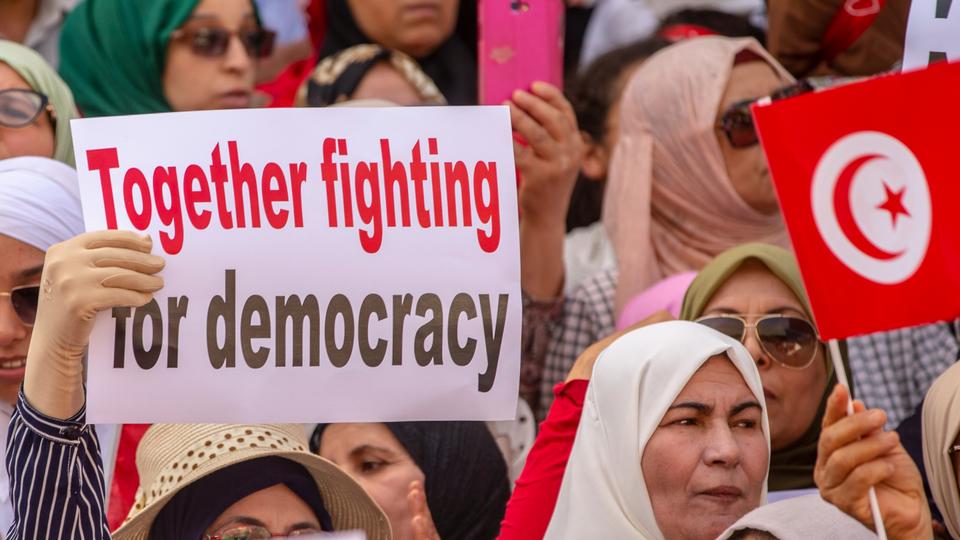
An overwhelming majority of 94.6% voted “yes” in Tunisia’s constitutional referendum last Monday, according to the chairman of the electoral authority ISIE, Farouk Bouasker, What does that mean for Tunisian democracy?
Emna Mizouni
Last Monday, the 25th of July, one year after Tunisia’s backslide, several hundred people gathered in front of Tunis’ Municipal Theatre, men, women, elders, to prematurely celebrate the President’s new constitution. The supporters’ reaction was a foregone conclusion given that the result was known before voting even started. Unfair campaign practices, unethical appointments to the Independent High Authority for Elections (ISIE), and other process questions left many Tunisians who did not make it to the Municipal Theatre that day disenchanted or wilfully disengaged. Similar to the jubilee of the 25th of July, 2021, the few supporters who did gather were cheering to get rid of Ennahdha (the Islamic democratic party) and the existing political class. For the celebrating protesters, these politicians led the country to economic straits and didn’t truly fulfill the aspirations of the 2011 revolution. Their joy contrasted with a few days earlier, where, in the same location, hundreds of citizen protesters standing against the same draft constitution were brutally repressed by the police, with some arrested.
As much as one could sympathize with their joy and aspirations for a better future, it falls short of the reality of a fraudulent process and a compromised elections’ body legitimizing unaccountable one-person rule through a draft constitution that many people did not even read or understand. A journey towards authoritarianism started on 25th of July, 2021 and led to President Saïed seizing power gradually to opaquely draft a new constitution, despite losing the faith of most of his presidential advisors and some political supporters. While a commission was created to advise on the constitution, its members denounced the document upon its release, at the end of June 2022. Most observers and analysts, and the majority of Tunisians who chose to abstain during the referendum, agree that this new constitution directly threatens checks and balances, political plurality, and core principles of what made Tunisia the sole democratic regime post-Arab Spring.
The President of the ISIE, Mr. Bouasker announced that the final results are 2,830,094 voters out of 9,278,541 registered. Initially, Bouasker announced different numbers for the voters: 2,458,985 voters participated in the referendum out of 8,929,665 registered voters. So about 400,000 voters were added to the count after 10 pm on July 25th. These numbers are higher than the margin of error of voters within the country and exceed the registered voters abroad in the Americas. This addition of voters is dubious, given the goal of the regime to reach the needed participation threshold to legitimize the vote.
Surprisingly, considering growing unpopularity since Kaïs Saïed first took power, the number of “yes” votes almost matched the number of people who voted for Saïed in the second round of the 2019 presidential elections. Yet, this is a low figure for Saïed, who would have wished for a much higher turnout to justify his one-year slow-moving one-man regime and hyper-presidential consolidation of power.
While many national and international outlets proclaim that “Tunisia” endorsed the draft constitution as presented to the 25 July referendum, it’s essential to recall that this process was marred by incidents, inconsistencies, obstructions, and breaches — before and during voting day.
During voting day and in many places across the country, some voting centers refused to announce the exact participation rates to civil society organizations and market research firms observing the process. The lack of transparency appeared aimed at eliminating any potential inconsistencies with rates later announced by the ISIE.

Observers also reported a number of significant breaches. For instance, during the (short) campaign, national mainstream TV channels mainly promoted the “yes” vote by a few unknown political parties and organizations, which skewed a fair coverage of “no” and boycott arguments. During voting day, President Saïed broke electoral silence when casting his vote in a speech to the press. International observers, such as from the EU or the Carter Center, did not participate, and many local observers lacked adequate training.
It’s worth noting that, in the last three years following the presidential and legislative elections, many changes occurred to the electorate, but given the change in the nature of the ISIE and the short timeline for the referendum, many decided to boycott. Many voters doubted official results from the ISIE, given that, following the special measures in 2021, the President directly appointed members of the ISIE, undermining the institution’s impartiality, a trend which goes in hand with other rebuffs, such as the recommendations of the Venice Commission on the neutrality and credibility of the elections and referendum upon his Decree 22.
Among those who supported Saïed’s constitution, when asked about their reasons to vote in favor of it, they cited socioeconomic hardships and social unrest, recently exacerbated by the pandemic and the impact of the war in Ukraine. During the pandemic, Tunisia suffered through a collapsing health care system and witnessed the highest death rate per capita in Africa with limited initial access to vaccinations, later mitigated through international support. Tunisia relies on wheat exports, a majority of which come from the Black Sea, including Russia and Ukraine. The war in Ukraine has disrupted supply chains, while driving prices of other essential goods up, such as oil, sugar, flour, and semolina, leading to rationing in many instances, before and during Ramadan.
The “yes” camp argues for stability — lower inflation, employment, and economic growth. They want to see an end to the misery of the last decade, get rid of an inefficient parliament given the last legislature (elected in 2019 and dismantled in 2021), and many are against the Ennahdha movement, including Rached AlGhannoushi and the rise of the Islamists. Only a limited number of “yes” votes were cast because they were convinced by the proposed new constitution.
Age, education (below university level) and the geographic location (northwest and center-west deprived and marginalized regions mainly) were key drivers of the “yes” vote. Women, older citizens (middle-age to elderly) voted “yes,” while the youth who voted for the Saïed in 2019 mostly abstained.
The lack of inclusion during the constitutional drafting process influenced the decision to boycott. Fatigue with the unstable political scene, limited trust in the political system and the belief that the result will be fraudulent or could not affect real change, not to speak of a simple lack of civic engagement, contributed to the high rate of abstention.
For many in opposition circles, which included a majority of the educated, expressing support for the “no” vote derived from fear of sliding back to the days of dictatorship, given police violence against most of the peaceful opposition protests, and Saïed’s limited results since his drastic political measures in 2021. The “no” voters also refused to agree with the content of the proposed constitution and the concentration of powers in the hands of the President. This isn’t a mere perception since the draft constitution enshrines a lack of separation of powers, with the President granted to oversee the executive, legislative and judicial branches, including powers to terminate any of their mandates, while remaining unaccountable. The President will now have the right to directly dissolve the parliament, rather than such action being taken by the constitutional court (he opposed its appointment in 2021).

As for the constitution in question, its process went through different stages: from a national online consultation with a poor participation rate to a biased campaign. The national organizations and political parties that called for the boycott believed that participation would legitimize the process. Boycotters highlighted low turnout for the national consultation, the misleading announcement of the President regarding the consultations’ results, as well as the announcement of the constitutional commission despite major criticism on the inclusiveness of the process.
The first draft of Saïed’s constitution was published for the public on June 30th, 2022. Immediate criticism on its content, including grammatical, and fundamental errors, led the President to hastily publish a corrected version. Many experts, media commentators, politicians, lawyers and judges denounced the content of Saïed’s constitution in non-state owned media, given major concerns and threats to democratic principles and human rights.
For example, in Article 55, legislation could limit citizens’ rights and freedoms in certain cases, such as of national security, defense or public health. This article can be interpreted to provide ways to shrink the civic space even more, limiting the freedom of information, media and press, the right to public transparency in any matter under the label of national security, especially in the era of a continuous state of emergency. Similar legal interpretations and abuse of power using the state of emergency brought parliamentarians and civilians to the military court before and after 25th of July, 2021. Furthermore, a couple of days before the referendum, journalists, including the President of the Journalists Union SNJT, Mr. Mohamed Yassin Jlassi, were beaten up on Habib Bourguiba Avenue while protesting against this constitutional project and the restriction of media and threats to democracy, while many were arrested, as recalled earlier. On the day of the referendum, some of the observers and media on the ground were harassed while collecting data in some voting centers, which interrupted their work.
Another controversial article is Article 90, which states in case of war or imminent danger, the presidential mandate could be extended until the situation goes back to normal. This new constitution could render any scenario as a reason to an indeterminate mandate. By shifting from the political regime to the presidential one, not only would Saïed maintain absolute power, but it could be for an unlimited time, exemplified by his interpretation of Article 80 of the 2014 Constitution using imminent danger to take over the government and freeze the parliament.
The most controversial article of Saïed’s constitution is Article 5. Based on the Islamic Maqasid doctrine, it clearly states that the State is to preserve human life, religion, lineage, and property. It suggests that Tunisia is part of the “Islamic Nation,” consistent with Ennahda’s project of historical and geopolitical identity. This has implications for further entwining the constitution and the State with sharia law. This main article was the reason why many believe that Saïed’s project will drive the country towards becoming an Islamic Republic. Compared to the 2014 Constitution that granted the right of faith and freedom of religious belief, this adopted version could open Pandora’s Box to review and revoke individual freedoms that the citizens of Tunisia have gained over the years and after the 2011 uprising. This also has the potential to upend the gains in rights that women won gradually since the country’s independence. Similarly the dramatic overturning of Roe vs Wade in the United States, could provide political cover for those who would seek to question women’s rights in the new constitution. In such an environment, activists and organizations will be trying to maintain what was already achieved.
The whole voting process and Kaïs Saïed’s new constitution give the illusion of bringing solutions to existing challenges of a collapsing economy and social unrest fomented by the dysfunction of the previous political discourse. However, the results will not be directly actualized and the resulting unrest when economic conditions do not immediately improve could trigger major protests and chaos.
Since 1957, Tunisians have been celebrating Republic Day on July 25th. In 2021, Saïed chose this same day and anniversary to freeze the parliament, and dismiss the Prime Minister. A year later, the dream of democracy in Tunisia is ending.
The challenges this constitution presents have catalyzed previously dispersed political parties to consolidate against the president’s project. Now it is up to the different actors in Tunisian society; citizens, organizations, and political parties to stop this backslide. Otherwise, it would be the end of the only “fragile” democracy that survived a decade after the Arab uprising.



